When it comes to city passes and travel cards, it’s usually fairly easy to figure out whether they would be worth it for you or not. For things like the Paris Pass or London Pass, they have a list of the most popular attractions and how much they cost, right there for you to see. The Swiss Travel Pass, however, is shrouded in mystery, or at least it was until I spent several days tracking down all of the prices and benefits.
A great many of the visitors and commenters on my popular page about where to go in Switzerland on a short visit are wondering whether the Swiss Travel Pass is a good deal. Embarrassingly, I’ve always had to answer that I found the pass too confusing to confidently advise people on. Now that has all changed, after literally days of research.
Note: This article was last updated in February, 2024.
Disclosure: This is a reader-supported website and some of the links are affiliate links where a small commission is paid to help keep this site going, but the cost to visitors is the same. The Swiss Travel Pass seems quite expensive at first, so it felt like it might be hard to get your money’s worth out of it. As it turns out, it’s pretty easy to get good value, and it’ll be a good deal for many visitors.
New in 2024
Prices increased an average of 5.9% from 2023 on the Swiss Travel Passes, but the Half Fare Card remains at CHF120, which is where it’s been for many years. Train fares in the country increased by similar percentages so the value is basically unchanged. There were no other notable changes to service or the included attractions and train routes.
>>>Buy the Swiss Travel Pass online
Where to stay in Interlaken and the Lauterbrunnen Valley
Since most people reading this will be visiting the Interlaken area and I get so many questions about it, I decided to write a detailed guide on which area to stay in while visiting this area.
>>>Where to stay in Interlaken or the Lauterbrunnen Valley in Switzerland
I included many huge photos in that post so readers will be able to get a better idea of what each place looks like and they are worth a look by itself.
>>>Lucerne or Interlaken: Which to visit and how long to stay?
The article just above will help you decide on how long to spend in each of Switzerland’s two best tourist areas.
Are you 100% sure where you want to go in Switzerland? This should help
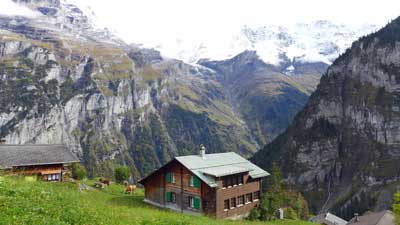
Zurich and Geneva are pleasant but dull. The good news is that Switzerland is packed with amazing sights and none of them are the big cities. If you aren’t 100% locked in yet, please read the article below and I think you’ll enjoy it.
Is the Swiss Travel Pass a good deal? Here's the short version

The bottom line is that the scenery, train journeys, and cable car rides in Switzerland are stunning and not found anywhere else in the world. They are also quite expensive if you pay for them one at a time. So no matter how you visit Switzerland, you are going to be paying quite a bit, or skipping the absolute best things that you’ve come there to see.
With good planning it’s quite easy to get great value out of a Swiss Travel Pass, but it might be a poor choice for those who don’t like to plan ahead. You can easily do a scenic train ride and a cable car in the same day, and still have time to do a scenic hike in the process.
First class or second class? Good news for most people
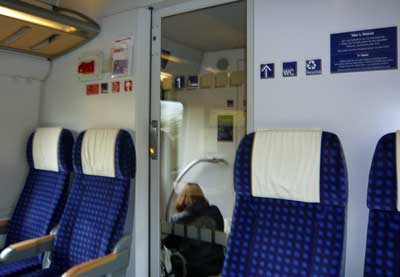
That said, Swiss Trains are literally the nicest in Europe and even the Second Class seats and carriages are nicer and roomier than trains in neighboring countries. The First Class seats are larger and nicer with only 3 across the cabin instead of 4, but honestly Second Class is perfectly comfortable for almost everyone.
Again, First Class on European trains like this is generally popular with business travelers where the company is paying and they need to get work done during the ride, and also senior citizens who don’t want to worry about a carriage full of backpackers. For most of the rest of us, Second Class is more than comfortable enough and the seat width and legroom compare to business-class airline seats. I’m a big and tall guy and I almost always travel in Second because it’s plenty comfortable enough and all the seats arrive at the same time anyway.
The longer you'll be in Switzerland, the better deal a Swiss Travel Pass will be
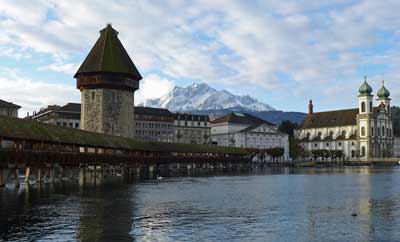
In other words, if you are staying 5 days or fewer, you have to do the math to determine your best option. But if you are spending even 6 or 7 days in Switzerland then the 6-day or 8-day Pass is almost guaranteed to be a great deal and your best choice. Once you have a Swiss Travel Pass you’ll absolutely love the ability to just hop on any train (excellent trains, always on time) and most boats and cable cars without having to worry about the cost. The per-day cost of an 8-day Pass even if you only use 6 of those days is about CHF65, and Switzerland is filled with amazing train rides and boats and cable cars that can get you that much value before noon each day.
Schilthorn (50% discount) and Jungfraujoch (25% discount) are cheaper with a Swiss Travel Pass
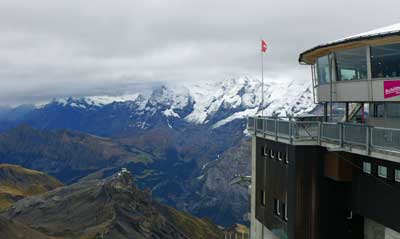
Both of those peak experiences are extraordinary and different from each other. Even so, compared to Jungfraujoch, Schilthorn is also faster and more comfortable on the way up and down. You can enjoy an excellent visit to Schilthorn in 4 hours or so (or a bit longer if you eat at the spinning Piz Gloria restaurant at the top), while a visit to Jungfraujoch requires closer to 6 hours.
NOTE: Schilthorn closes for maintenance for a week or two in late November most years.
Consider the Swiss Half-Fare Card instead
If you AREN’T going to be doing two or more of the long (and expensive) scenic train trips, you will get much better value out of the Swiss Half-Fare Card, which is explained a bit below.
Mt Rigi, near Lucerne, is 100% covered by the Swiss Travel Pass
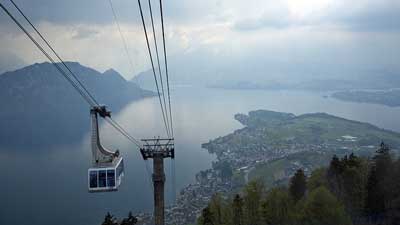
Is a Swiss Travel Pass right for you?
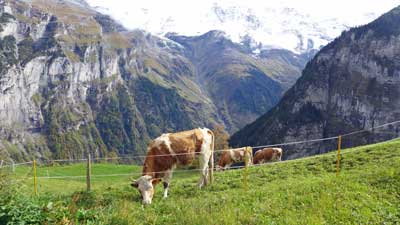
Most people only visit Switzerland for 5 or 6 days at most, so the 3-day and 4-day passes are the ones to focus on. But if you are staying for 8 days or more, those longer passes are almost certainly a great deal for you.
Long story short, if you plan on doing 2 of the more expensive scenic trains and the Jungfraujoch railway or the Schilthorn cable car, then the pass will save you money. Switzerland is expensive, but it’s worth it, and the travel pass can help make it a bit more affordable.
What the Swiss Travel Pass includes
- Free rail travel on normal trains and most scenic trains
- Discounted travel (about 50%) on popular tourist mountain trains
- Discounted travel (about 50%) on popular tourist cable cars
- Free travel on public transport in 75 towns and cities
- Free entry to around 500 museums in Switzerland
The Swiss Travel Pass covers the fare on the most popular scenic and panoramic trains. You can choose a normal seat in a regular carriage for no additional cost, but there is a supplement of CHF8 to CHF49 for a reserved seat in one of the special panorama carriages on these routes.
Prices of the 2024 Swiss Travel Pass
1st Class
- Adult 3-day Pass: CHF389
- Youth (4 to 25) 3-day Pass: 274
- Adult 4-day Pass: 469
- Youth (4 to 25) 4-day Pass: 330
- Adult 6-day Pass: 602
- Youth (4 to 25) 6-day Pass: 424
- Adult 8-day Pass: 655
- Youth (4 to 25) 8-day Pass: 469
- Adult 15-day Pass: 723
- Youth (4 to 25) 15-day Pass: 512
2nd Class
- Adult 3-day Pass: CHF244
- Youth (4 to 25) 3-day Pass: 172
- Adult 4-day Pass: 295
- Youth (16 to 25) 4-day Pass: 209
- Adult 6-day Pass: 379
- Youth (16 to 25) 6-day Pass: 268
- Adult 8-day Pass: 419
- Youth (16 to 25) 8-day Pass: 297
- Adult 15-day Pass: 459
- Youth (16 to 25) 15-day Pass: 328
Swiss Travel Pass Flex
This version costs a bit more, but you don’t have to use the travel days consecutively. It’s a great option for anyone who won’t be taking longer train rides each day.
- Adult 3 Flex days in 1 month (1st Class): CHF445
- Adult 3 Flex days in 1 month (2nd Class): 279
- Adult 4 Flex days in 1 month (1st Class): 539
- Adult 4 Flex days in 1 month (2nd Class): 339
- Adult 6 Flex days in 1 month (1st Class): 644
- Adult 6 Flex days in 1 month (2nd Class): 405
- Adult 8 Flex days in 1 month (1st Class): 697
- Adult 8 Flex days in 1 month (2nd Class): 439
- Adult 15 Flex days in 1 month (1st Class): 755
- Adult 15 Flex days in 1 month (2nd Class): 472
Where to buy the Swiss Travel Pass
The Swiss Half-Fare Card – A better option for many visitors
Far less confusing than the Swiss Travel Pass, you can instead get a Swiss Half-Fare Card, and it will be a better deal for many travelers. The price is lower and it’s much easier to do the math, and the discounts are greater on some things as well.
- Swiss Half-Fare Card for 30 days: Adults – CHF120 or US$129
What you get:
Those who buy the Swiss Half-Fare Card will get 50% discount on all trains, buses, and boats in Switzerland for up to 30 days, as well as 50% off all public transportation in 75 cities and towns.
>>>Buy the Swiss Half-Fare Card
Why the Half-Fare Card is a better deal for many
While the Swiss Travel Pass is a great deal for those doing many of the expensive scenic journeys and mountain sights within a few days, it’s not good value for those who are doing fewer of the expensive trips and/or those who are staying longer. Also, the Swiss Travel Pass only provides a 25% discount on the amazing Jungfraujoch Railway, which costs between CHF120 and CHF224 return depending on your starting point, while the Half-Fare Card provides a 50% discount.
The math is simple as well. You can just add up the cost of the trains, boats, and buses you’ll be taking while in Switzerland, and if the total is more than CHF240 or so, the Half-Fare Card will save you money.
Example itinerary:
- Zurich to Interlaken train (2nd Class): CHF50
- Schilthorn Cable Car: CHF112
- Jungfraujoch railway from Interlaken: CHF205
- Interlaken to Lucerne train (2nd Class): CHF33
- Mt Rigi roundtrip from Lucerne: CHF84
- Engelberg (near Lucerne) to Mt. Titlis Cable Car: CHF92
- Lucerne to Zurich train (2nd Class): CHF25
Total per person: CHF601
Total with Half-Fare Card (including price of card): CHF420.50
It would be tough to do all of those things in 4 days, although it is possible. If you bought a 4-day Swiss Travel Pass here is how it adds up:
4-Day Swiss Travel Pass: CHF259
Supplements for Schilthorn, Jungfraujoch, and Mt. Titlis: CHF203.25
Total cost: CHF462.25
Bottom line on the Swiss Half-Fare Card
Since the Half-Fare Card lasts 30 days and provides a larger discount on Jungfraujoch, it is better value for visitors who want to include that scenic top-of-Europe rail journey on their trip. The discounts also add up more quickly on Schilthorn and Mt. Titlis trips, just to name two examples, and you don’t have to take many longer rail journeys to get value out of the Half-Fare Card.
Swiss Saver Day Pass (A one-day unlimited travel pass)
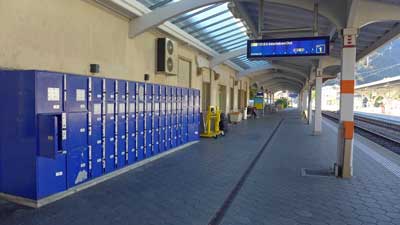
If you buy the Saver Day Pass at least 21 days in advance (and up to 60 days in advance) the 2023 cost is:
- 2nd Class (with Half Fare Card): CHF29
- 1st Class (with Half Fare Card): CHF82
- 2nd Class (with no Half Fare Card): CHF52
- 1st Class (with no Half Fare Card): CHF97
Once you research the normal cost of Swiss train fares you’ll see that the above prices are a very good deal for anyone riding more than 150 kilometers or so in a day. If you are just going, for example, from Zurich to Lucerne or Interlaken on a day, it’ll be cheaper to just buy that ticket individually. But if you are going from Geneva or Montreux to Interlaken or Lucerne then the Saver Day Pass will be much cheaper. Better still, you can use a Saver Day Pass to go from Interlaken to Geneva and back on the same day on the Goldenpass line and returning on the faster train through Bern, and it will still all be included for free.
If you don’t buy a Saver Day Pass at least 14 days in advance it’s more expensive, and if you only buy 1 to 3 days in advance it’s VERY expensive, so the key is to buy early. This is all confusing, but the Saver Day Pass should be a great option for many people only in Switzerland for one to three days.
Popular Swiss panorama scenic trains
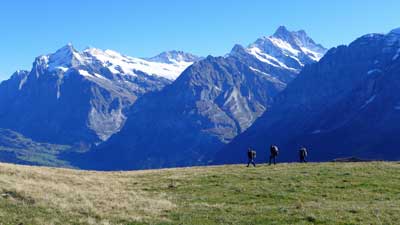
- Glacier Express
- Route: Zermatt to St. Moritz
- Train type: Panorama
- Journey time: 8 hours 3 minutes
- Distance: 291km
- 1st Class fare: CHF272
- 2nd Class fare: CHF159
- Compulsory seat reservation fee: CHF44 or 49
- Supplement for Swiss Pass holders: 13 to 33 for panorama carriage
- Bernina Express
- Route: Chur to Tirano and Lugano
- Train type: Panorama and bus
- Journey time: 4 hours 13 minutes and 3 hours 10 minutes
- Distance: 148km and 90km
- 1st Class fare: CHF113
- 2nd Class fare: CHF66
- Compulsory seat reservation fee: CHF32
- Supplement for Swiss Pass holders: 10 to 14 for panorama carriage
- GoldenPass Line
- Route: Lucerne to Montreaux
- Train type: Panorama
- Journey time: 5 hours 8 minutes
- Distance: 191 km
- Prestige Class fare: CHF131
- 1st Class fare: CHF96
- 2nd Class fare: CHF56
- Supplement for Swiss Pass holders: 8 to 15 for panorama carriage
- Gotthard Panorama Express (formerly Wilhelm Tell Express)
- Route: Lugano or Locarno to Lucerne
- Train type: Panorama and boat
- Journey time: 5 hours 21 minutes
- Distance: 182 km
- 1st Class fare: CHF164
- 2nd Class fare: CHF135
- Supplement for Swiss Pass holders: 39 to 49 for panorama carriage
- Swiss Chocolate Train
- Route: Montreux to Broc round trip
- Train type: Panorama or First Class
- Journey time: X hours X minutes
- Distance: 82 km
- 1st Class fare: CHF99
- 2nd Class fare: 89
- Supplement for Swiss Pass holders: 39
Popular Swiss scenic and theme trains
The scenic trains below are also extremely popular as sightseeing journeys rather than just as transportation, but can be used as both.
- Jungfraujoch round trip
- Route: Interlaken to Jungfraujoch
- Train type: special mountain train
- Journey time: 4 hours 41 minutes, round trip, plus time on top
- Distance: 73 km
- 1st Class fare: N/A
- 2nd Class fare: CHF224
- Supplement for Swiss Pass holders: 147 (so, a saving of CHF77)
- Gornergrat Railway
- Route: Gornergrat Railway
- Train type: Cog railway
- Journey time: 44 minutes return
- Distance: 10 km
- 1st Class fare: N/A
- 2nd Class fare: CHF90
- Supplement for Swiss Pass holders: 45
- Rigi round trip
- Route: Lucerne to Rigi
- Train type: Cog railway
- Journey time: 3 hours 25 minutes, plus time at the top
- Distance: 58 km
- 2nd Class fare: CHF78
- Supplement for Swiss Pass holders: None (this one is free with the pass)
- Mt Rigi Excursion (one-way and walk down)
- Route: Lucerne to Mt Rigi
- Train type: cogwheel train and/or cable car
- Journey time: 45 minutes up
- 1st Class fare: N/A
- 2nd Class fare: 49
- Supplement for Swiss Pass holders: 0
- Lotschberg Mountain Route and Centrovalli
- Route: Bern to Locarno
- Train type: Narrow gauge
- Journey time: 4 hours 40 minutes
- Distance: 212 km
- 1st Class fare: CHF158
- 2nd Class fare: CHF90
- Supplement for Swiss Pass holders: 5
- Jura round trip (Watchmaking Tour)
- Route: Neuchatel through Jura
- Train type: Regular
- Journey time: 3 hours 0 minutes
- Distance: 143 km
- 1st Class fare: CHF168
- 2nd Class fare: CHF108
- Supplement for Swiss Pass holders: 0
- Pre-Alpine Express
- Route: St. Gallen to Lucerne
- Train type: Regular
- Journey time: 2 hours 15 minutes
- Distance: 146 km
- 1st Class fare: CHF83
- 2nd Class fare: CHF47
- Supplement for Swiss Pass holders: 0
- Jura Foot Line
- Route: Basel to Geneva
- Train type: Regular
- Journey time: 2 hours 40 minutes
- Distance: 248 km
- 1st Class fare: CHF132
- 2nd Class fare: CHF75
- Supplement for Swiss Pass holders: 0
Popular Switzerland cable car rides
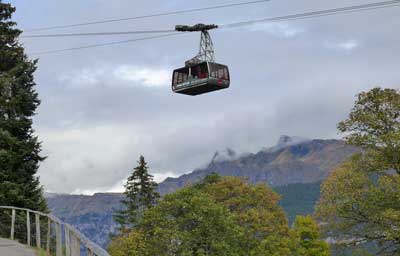
- Schilthorn
- Route: Stechelberg (Lauterbrunnen) to Schilthorn
- Train type: cable car
- Journey time: 1 hour
- 2nd Class fare: CHF108
- Supplement for Swiss Pass holders: 54
- Engelberg to Mt. Titlis cable car
- Route: Engelberg to Mt. Titlis
- Train type: cable car
- 2nd Class fare: CHF96
- Supplement for Swiss Pass holders: 46
The Swiss Travel Pass also includes free museum admission, but…
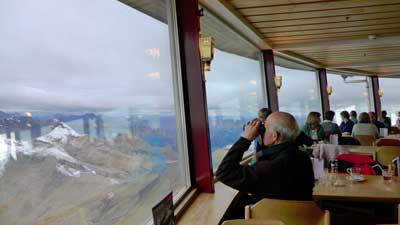
The problem is that the museums are only free on valid travel days, and almost no one would visit more than one or two museums with a Swiss Travel Pass. The trains and cable cars are so expensive that the pass gives very good value to cover those, so you don’t want to waste precious sightseeing time walking through a museum that only costs CHF10 anyway.
In other words, calculate the value of a Swiss Travel Pass on the travel savings only, and if you visit a museum here or there, then great. Most people are better off trying to squeeze in an additional train ride each day, and ignoring the museums. Switzerland is all about the outdoor scenery. As nice as the museums may be, they are not why you are there.
The pass includes free public transport in most Swiss cities
Similar to the free museum part of the offer, it’s best to ignore or minimize the value of free public transportation. It could be helpful in Zurich, but in most other Swiss tourist towns you won’t need much public transport. In fact, in Interlaken, each hotel or hostel guest automatically gets a card for free public transportation within the town (including between the two train stations).
So you might use a ride or two each day on public transport, but that won’t add up to much in terms of value of your Swiss Travel Pass.

Hi Roger,
Thanks for the comprehensive article!
I will be going to Switzerland for a period of 3 days during June (2 youths below 25), and we are unable to decide which pass is better (Swiss travel pass/half fare pass/supersaver day pass). We will be staying in Zurich for 3 nights and traveling out for day trips to Lucerne & Interlaken. The following is our itinerary:
Day 1: Zurich – Lucerne – Mt Titlis tour – tour around the town – lake Lucerne (boat ride?) – Zurich
Day 2: Zurich – Lucerne – goldenpass (Lucerne – Interlaken express) – Jungfrau tour – sightseeing around Lauterbrunnen & grindelwald – Zurich
Day 3 – Zurich town – Chur – Bernina train to Tirano – Milan
Can you please give us some suggestions on which pass will be the most suitable for us?
Thank you!
Joanne,
If you are definitely locked into staying in Zurich then the Swiss Travel Pass is probably your best option. If you do that itinerary as planned it will be three very busy days where you’ll be on trains most of every day. Since all of those train rides will be included with the Swiss Travel Pass, it should be your cheapest option. You only get a 25% discount on Jungfraujoch, but I still think you’ll save enough on the trains that it’ll be cheaper.
However, if you AREN’T locked into staying in Zurich I think the Half Fare Card might be better. You might have a quick look at my main article on where to go in Switzerland. The main point is that Zurich is VERY expensive for hotels, even compared to the other cities, and it’s a fairly generic large city. You’ll have much better and more interesting experiences if you stay in the Interlaken area and perhaps also in the Lucerne area. Also, especially with so many sights in such a short time, I don’t know if I would recommend those long scenic train trips. If you stay in the Interlaken area you’ll see amazing scenery all around you, especially while on the short train rides and cable cars and such. And the same is true in Lucerne.
In other words, I think those scenic trains are really nice and they are a good way to see a lot of scenery in a short time, especially for someone who can’t walk much and would rather see Switzerland from a train window. But if you actually stay in the mountain towns you can experience a lot more than you get out a train window. I’m happy to answer other questions if you have them. -Roger
Hey Roger,
I know their is more than sufficient information on this site but still questions 🙁 regarding optimum usage of Swiss Pass before I book one. Also I didn’t see any option for discount using Swiss Travel Pass on website to book tickets for Jungfrau
My travel plan so far 🙁 3 days) 4th May – 7th May
Day 1 Reach Zurich @ 1300 … take train to Interlaken if possible explore the place
Day 2 Visit Jungfrau … day pretty much covered (explore places if time permits) – open to suggestion on places
Day 3 Move to Bern by train then planning to visit Lucern and return by night to Bern
Day 4 Departing to Paris by morning train
Not too confident on complete utilisation of pass.
Thanks in advance !
Cheers
Tanvi
Sorry to add to the above questions .. we are 2 adults + 9 yrs old totally 3 so if it makes sense to buy half fare card or swiss travel Pass.
Tanvi,
It doesn’t look like you’ll be taking enough train rides to get good value out of a full Swiss Travel Pass. With the Half Fare Card for each adult you can have your 9-year-old come for free after you get a Swiss Family Pass, which is available when you get there or online. Especially with the larger discount on Jungfraujoch, the Half Fare Card should come out quite a bit cheaper in the long run. Let me know if you have any other questions. -Roger
Hi Roger…. Want your advice regarding my trip to Switzerland from 23rd to 29th June…Will be staying at torgon…. What places will be able to cover from torgon…. Plz suggest…. Thnx
Bikash,
I’d never heard of Torgon, but I see on the map that it’s near Montreux. I don’t know of any great sights in that area, although I assume there are some because Switzerland is full of lovely views and sights. I’d say that you should spend at least a couple days in the Interlaken area seeing the main sights that I discuss in the main article on where to stay in Switzerland. Most Swiss trains are fast and run frequently, so you can get across the country and back in one day if you start early. If you are staying in Torgon the whole time it might be wise to get a Swiss Travel Pass so you can ride the trains for free and get to other places frequently. Sorry I’m not of more help on this. -Roger
Very nice and informative comments and advice
Roger,
Thank you for your reply. I was reading in another comment above about the cost for the Schilthorn as it relates to the passes. If I purchase a Half Fare Card, does that not help with the cost of the Schilthorn? I read somewhere yesterday that as of 2018 the Half Fare Card and Swiss Travel Pass work, to some degree, on the Schilthorn and other tourist ‘must do’ activities.
And, as for our plan to stay for 4 nights in Murren, we are really looking forward to the adventures around the area and relaxing in the scenic location. Is there enough stuff for us to do (cheese factory, hikes, Schilthorn, bike riding, Gimmewald, etc) to keep busy for three days while also relaxing some around Murren?
As for our final day in Geneva, any suggestions of how to make the most out of that day in terms of sites to see and things we MUST do to know we haven’t missed something? 🙂
Thanks again,
Greg
Greg,
Unless something has changed that I’m unaware of, the Half Fare Card gives a 50% discount on Schilthorn, and the Swiss Travel Pass offers the same discount. In fact, they both give that same discount on nearly everything that is part of Swiss infrastructure, in addition to the included things in the Pass.
Murren is a gorgeous village and there is plenty to do in the general area, but for most things it will mean going down two stops of the cable car and then the short bus ride to Lauterbrunnen. From Lauterbrunnen you are within a short train ride of dozens of great hikes and cable cars and other attractions. I’d probably recommend two nights in Murren and two nights elsewhere, but four nights in Murren would also be nice.
I’ve only briefly been to Geneva to see the fountain and a bit of the town. It’s nice, but there are no major sights there. I think just walking along the lake and through town will be pleasant. Sorry I’m not more help on that. -Roger
Hi,
I enjoyed reading this article, and the other one on Switzerland as well.
It’s very comprehensive and helps eliminate the unnecessary overrated tourist spots. I’m planning a trip with my parents In June 2018 for their anniversary, will it be possible to talk to you (e-mail etc.,) and get a little insight on some things?
Thanks!
Bhumi,
I can try to help you in the comments below the articles. The reason I prefer to do that is that other people might have the same questions, so they can see the answer in a public place. So ask your questions below and I’ll try to answer if I can. -Roger
Good morning Roger,
Doing some research for our trip this summer to Switzerland and having a tough time deciding on types of passes for our trip. We are planning on coming from Paris on July 9, directly to Murren in one day, via Basel and Interlaken. We have reserved 4 nights in Murren which leaves us 3 full days to fully experience the hiking/biking/Schilthorn, etc. around Murren while also having time to relax in the incredible beauty that surrounds. We will then be training to Geneva on July 13 with a return flight home schedule for the 14th from Geneva. With the train travel from Basel to Murren and then from Murren to Geneva, with some excursions intertwined around Murren and on Lake Geneva, I’m not sure if a Swisspass is worth it or if a 50% card is better.
Just throwing this out there to you for any tips you might have.
Thanks so much
Greg
Greg,
I’m happy to help. For most people it comes down to whether or not you’ll be taking at least two longer train rides, and by that I mean train rides that take the whole day. If you are just taking the normal trains between the major destinations then the fares usually don’t add up to enough to cover the Swiss Travel Pass, so the Half Fare Card is the better value. Let me know if you have any specific questions. -Roger
Roger,
Thanks a lot for your quick response. I will modify the itinerary to wengen as you suggested.
one more question on bookings for Jungfrau and Titlis . Is it good to do advance bookings now or book on the date of the visit ?
if I book in advance , is there a possibility to shift the reservation to the next day , in case of bad weather on the reserved day ?
thanks.
Uditha,
I’m not sure if advance booking on those things locks in a specific time or not, but I wouldn’t do it anyway. Because of the ever-changing weather at the peaks, it’s best to book and go when you know it will be clear enough. The prices are the same no matter when you book, and those things very rarely sell out, and especially not more than a day or two in advance. Have a great trip. -Roger
Hi,
Thanks for detailed explanation.
I am planning to visit italy, austria and switzerland.
I am confused between swiss pass vs multi country pass. I will be staying at villars-sur-ollon for one week with family (2 kids) and will have car to move between big cities. But to move around switzerland, i’m planning to use train only. 4 days out of week, will travel around luzern, interlaken and zermatt area.
Cost of 4 days swiss pass Vs 5 days 3 countries pass is coming to be same. What will I miss if i go for multi country pass ?
Thanks,
hp
HP,
If you get a multi-country rail pass that includes Switzerland it will include unlimited train travel within the country on those days, but you don’t get discounts on the mountain peak attractions such as Jungfraujoch or Schilthorn, and you don’t get free travel on cable cars and boats. Those things are all quite expensive so the Swiss Travel Pass is great value for someone doing those tourist things. But if you are just riding on the normal trains then the other rail pass gives you more. Have a great trip. -Roger
Hi,
This blog seems to be very comprehensive and it helped me a lot for clear my doubts about swiss travel cards. good job Roger 🙂
I am planning to visit Luzern/Interlaken region with my family [ me, wife , 2 kids aged 9 and 5 ] on 23rd – 26th April. Below is our itinerary. Seems Half fare card will do best deal for us. could you pls check and advice.
23rd April : reach Lucern via Basel from train , check-in @ hotelin Luzern
24th April : Titlis visit [ Morning ] , Rigi round trip with luzern lake boat ride [afternoon]
25th April :Luzern to Interlaken OST train ride , Jungfrau visit , sightseeing in Murren/Gimmelwald , return back to Luzern
26th April : city tour in Luzern [ chappel bridge , lion monument ] and check -out from hotel and travel to Paris in the afternoon
Uditha,
Yes, the Half Fare Card seems like the best value for you by quite a bit. Your itinerary looks good, but the day going to Titlis in the morning and the boat trip and Rigi in the afternoon will be a busy one. If the weather is clear at the top of both peaks and you get an early start you can do it, though it will take all day.
And your trip to Interlaken is also very ambitious. Make sure you check the weather at Jungfraujoch before you leave in the morning because it can be cloudy or foggy up there at any time. If it’s clear in the morning, which it usually is, you’ll still want to get the earliest start possible. After that I would probably advise to spend your remaining time around Wengen or Lauterbrunnen because there is a lot to see in those areas, and getting up to Murren will be a bit out of the way. Basically, Jungfrau is one peak above Wengen and Lauterbrunnen, and Schilthorn is across the valley from it. If you are going up Jungfrau it’s probably best to stay on that side, rather than to cross over and go part way up Schilthorn for a short time. Again, that’ll be a long day, but you’ll never forget it assuming the weather is nice. Have a great trip. -Roger